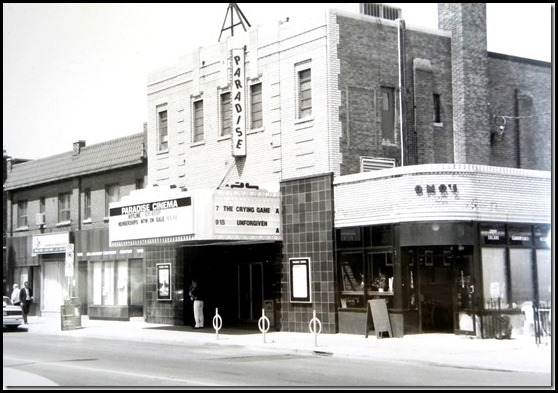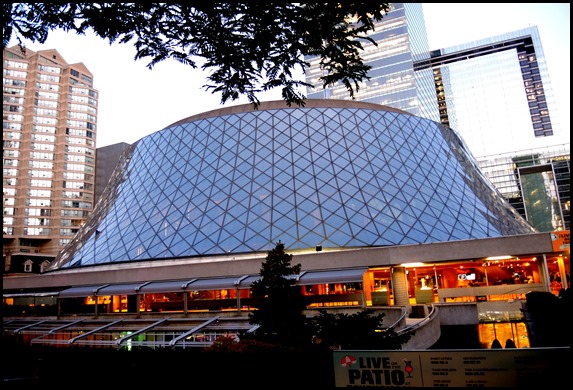The Capitol Building at 366 Adelaide Street West is on the north side of the street, a short distance to the east of Spadina Avenue. Completed in 1920, it was one of a group of warehouse lofts built to accommodate the needs of Toronto’s garment industry. Originally, it was named the Hobberlin Building. Constructed in 1920, its architects were Yolles and Rotenberg.
The seven-storey structure was one of the largest buildings constructed in the city in this style. The side walls contain structural steel, which was unusual for this decade. The yellow-brick facades are attractive, the seventh floor containing terracotta tiles with Art Deco designs. Strong vertical lines dominate the south facade facing Adelaide Street. Large rectangular windows allow much light to enter the interior, providing ideal work space for those who laboured in the garment industry. When built, it contained a sprinkler system, which was not common in the 1920s.
The large rectangular windows and strong vertical lines on the south facade of the Capitol Building.
Art Deco designs on the top of the southwest corner of the building.
Windows and designs on the southeast corner of the Capitol Building.
Entrance to the Capitol Building on Adelaide Street West.
The Capitol Building, located to the west of the popular Tutti Matti Restaurant on Adelaide Street West, a short distance east of Spadina Avenue.
Note: some of the information for this post was obtained from “Toronto Architecture” by Patricia McHugh.
To view the Home Page for this blog: https://tayloronhistory.com/
To view previous blogs about old movie houses of Toronto—historic and modern
https://tayloronhistory.com/2013/10/09/links-to-toronto-old-movie-housestayloronhistory-com/
To view links to other posts placed on this blog about the history of Toronto and its buildings:
https://tayloronhistory.com/2013/10/08/links-to-historic-architecture-of-torontotayloronhistory-com/
Recent publication entitled “Toronto’s Theatres and the Golden Age of the Silver Screen,” by the author of this blog. The publication explores 50 of Toronto’s old theatres and contains over 80 archival photographs of the facades, marquees and interiors of the theatres. It also relates anecdotes and stories from those who experienced these grand old movie houses.
To place an order for this book:
Theatres Included in the Book:
Chapter One – The Early Years—Nickelodeons and the First Theatres in Toronto
Theatorium (Red Mill) Theatre—Toronto’s First Movie Experience and First Permanent Movie Theatre, Auditorium (Avenue, PIckford), Colonial Theatre (the Bay), thePhotodome, Revue Theatre, Picture Palace (Royal George), Big Nickel (National, Rio), Madison Theatre (Midtown, Capri, Eden, Bloor Cinema, Bloor Street Hot Docs), Theatre Without a Name (Pastime, Prince Edward, Fox)
Chapter Two – The Great Movie Palaces – The End of the Nickelodeons
Loew’s Yonge Street (Elgin/Winter Garden), Shea’s Hippodrome, The Allen (Tivoli), Pantages (Imperial, Imperial Six, Ed Mirvish), Loew’s Uptown
Chapter Three – Smaller Theatres in the pre-1920s and 1920s
Oakwood, Broadway, Carlton on Parliament Street, Victory on Yonge Street (Embassy, Astor, Showcase, Federal, New Yorker, Panasonic), Allan’s Danforth (Century, Titania, Music Hall), Parkdale, Alhambra (Baronet, Eve), St. Clair, Standard (Strand, Victory, Golden Harvest), Palace, Bedford (Park), Hudson (Mount Pleasant), Belsize (Crest, Regent), Runnymede
Chapter Four – Theatres During the 1930s, the Great Depression
Grant ,Hollywood, Oriole (Cinema, International Cinema), Eglinton, Casino, Radio City, Paramount, Scarboro, Paradise (Eve’s Paradise), State (Bloordale), Colony, Bellevue (Lux, Elektra, Lido), Kingsway, Pylon (Royal, Golden Princess), Metro
Chapter Five – Theatres in the 1940s – The Second World War and the Post-War Years
University, Odeon Fairlawn, Vaughan, Odeon Danforth, Glendale, Odeon Hyland, Nortown, Willow, Downtown, Odeon Carlton, Donlands, Biltmore, Odeon Humber, Town Cinema
Chapter Six – The 1950s Theatres
Savoy (Coronet), Westwood
Chapter Seven – Cineplex and Multi-screen Complexes
Cineplex Eaton Centre, Cineplex Odeon Varsity, Scotiabank Cineplex, Dundas Square Cineplex, The Bell Lightbox (TIFF)








